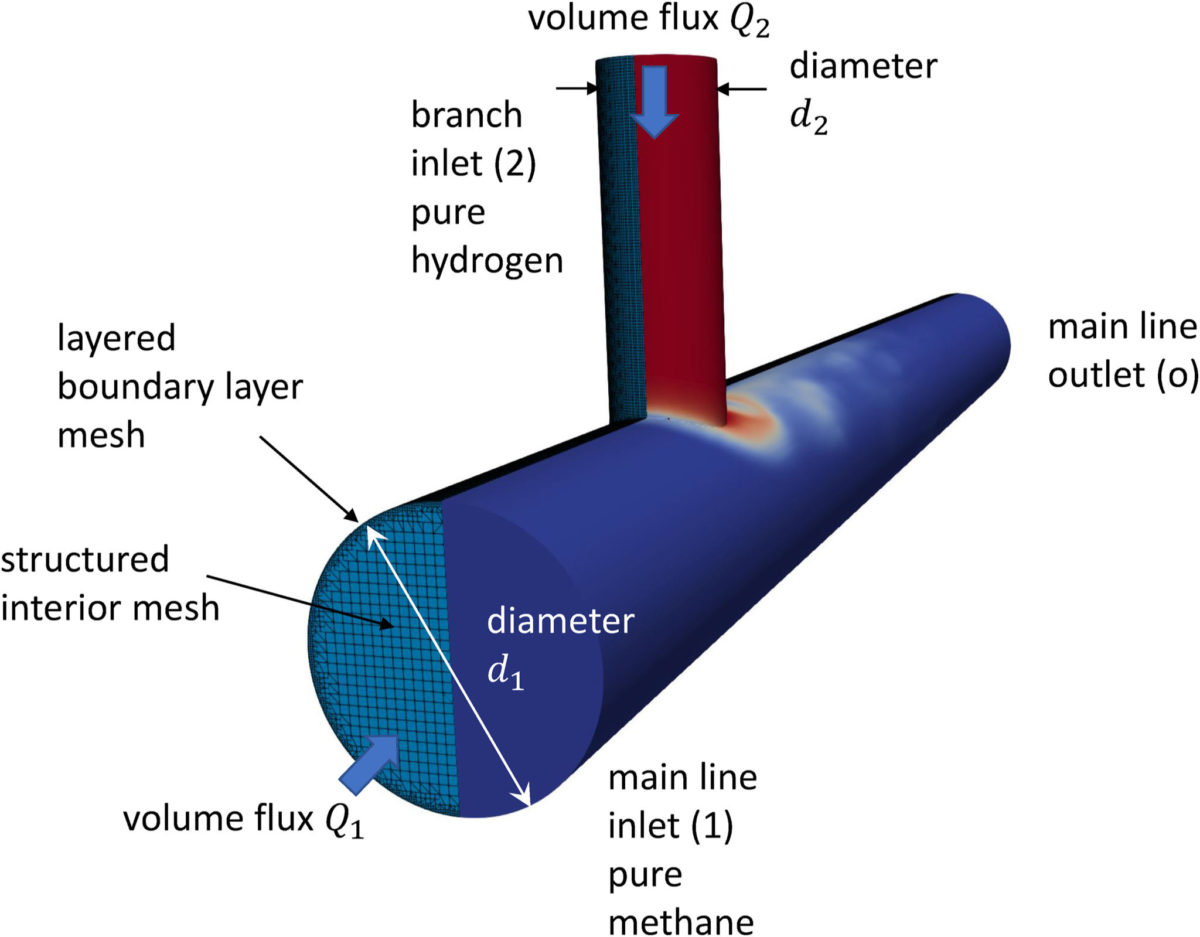From pv magazine Global | via the Hydrogen Stream
University College London researchers have said in a new study that the pumping of hydrogen into gas networks poses risks and requires a rethinking of usual blending techniques. “The strongly inhomogeneous distribution of hydrogen within the pipe flow and on the pipe walls could indicate the location of potential pipe material degradation, including embrittlement effects of gas pipelines,” the researchers said in the International Journal of Hydrogen Energy. They focused on the common blending method, based on the injection of hydrogen through a side branch into a main gas header pipe (T-junction). “The low molecular mass of hydrogen reduces the penetration of a side-branch flow and increases the buoyancy forces leading to stratification with high hydrogen concentrations on the upper pipe surface, downstream of the branch,” the team said. “Top-side injection leads to the hydrogen concentration remaining >40% for up to eight pipe diameters from the injection point for volumetric dilutions less than 30%. Under-side injection promotes mixing within the flow interior and reduces wall concentration at the lower surface, compared to top-side injection.”
Nel has decided to double production of alkaline electrolyser stacks to 1 GW, by building a new, fully automated production line in Herøya, Norway. The €35 million (AU$50 million) production line is expected to be in operation from April 2024. The company made the investment decision a couple of weeks after it secured a record order for 200 MW of alkaline electrolyser stacks from an undisclosed US customer. This week, the hydrogen solutions specialist received a purchase order from an undisclosed European client for the delivery of several units that will fuel light- and heavy-duty fuel cell electric vehicles.
Fortune Business Insights said in a new report that the global fuel cell vehicle market will likely grow from US$446.7 million in 2018 to US$6,731.4 million by 2026, representing a compound annual growth rate of 29.7%. “The main drivers for market growth are the stringent regulations on carbon emissions, increasing acceptance of electric vehicles in emerging economies, longer driving range offered by these vehicles, and growing demand for improved fuel efficiency,” said Fortune Business Insights. It added that it expects the Asia-Pacific region to dominate the fuel cell vehicle market due to favourable policies, followed by Europe and North America.
Research and Markets said in a new report that the global fuel cell market size will grow to US$2.9 billion this year. It said it expects the global market to hit US$9.1 billion by 2027, at a CAGR of 26.0%. Station application of fuel cells is the largest segment of the market, followed by transportation, said the market research firm.
Allied Market Research said in a new report that the global market for fuel-cell unmanned aerial vehicles (UAVs) was valued at US$1.4 billion in 2021, and is estimated to reach US$4.5 billion by 2031. “Based on region, North America contributed to the largest share in 2021, and will maintain its dominant share during the forecast period,” the consultancy said.
Brooge Energy, a Cayman Islands-based energy infrastructure service provider, has hired Ernst & Young to provide consulting services for its planned green hydrogen and green ammonia plant in the United Arab Emirates. The company plans to launch a related study later this month, with the final report expected in the fourth quarter.
This content is protected by copyright and may not be reused. If you want to cooperate with us and would like to reuse some of our content, please contact: editors@pv-magazine.com.








1 comment
By submitting this form you agree to pv magazine using your data for the purposes of publishing your comment.
Your personal data will only be disclosed or otherwise transmitted to third parties for the purposes of spam filtering or if this is necessary for technical maintenance of the website. Any other transfer to third parties will not take place unless this is justified on the basis of applicable data protection regulations or if pv magazine is legally obliged to do so.
You may revoke this consent at any time with effect for the future, in which case your personal data will be deleted immediately. Otherwise, your data will be deleted if pv magazine has processed your request or the purpose of data storage is fulfilled.
Further information on data privacy can be found in our Data Protection Policy.